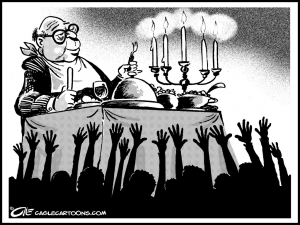By Michael Hoexter
In a previous post, I outlined how leaders in positions of political power, especially at the national level, are chosen to fulfill a unique ethical role, that differs from that which is appropriate for private individuals and business leaders. Because of the power that accrues to political leaders and the hopes attached to them by their constituents, politicians’ actions in office have much greater repercussions than, for the most part, the actions of individuals and individual businesses in the private sector. Once elected or appointed, political leaders have choices to make, often with room for their own discretion, which draw upon values they hold, values that are in part conditioned by, though not entirely reducible to their political and political-economic ideology. These decisions most often are concerned with policymaking, budgeting, and legislation that impact an entire nation or the international system of nations. Continue reading


 The austerity campaign, a favorite for the last four years of politicians and financial tycoons, remains a seemingly self-contradictory and baffling phenomenon for those who know that it goes
The austerity campaign, a favorite for the last four years of politicians and financial tycoons, remains a seemingly self-contradictory and baffling phenomenon for those who know that it goes 
 Rational public debate about the economy and government’s role in the economy is currently in extremely short supply. In a
Rational public debate about the economy and government’s role in the economy is currently in extremely short supply. In a 








